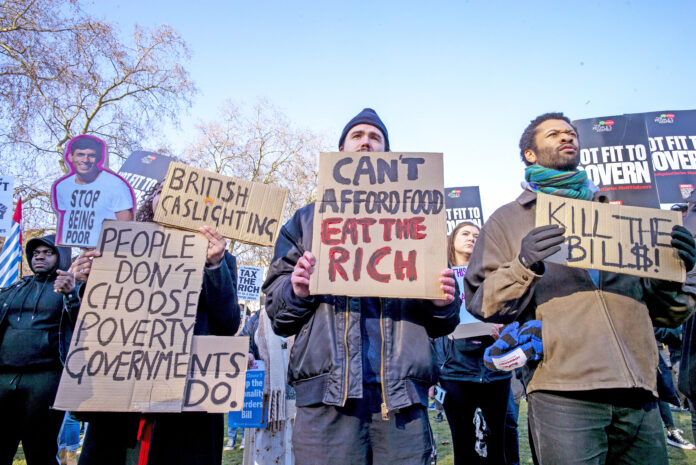Jacob Rees-Mogg: ‘Scrap green levy’
We say: Nationalise the energy companies and invest in renewables
Duncan Moore, Plymouth Socialist Party
Boris Johnson ordered ministers to come up with solutions to the cost-of-living crisis in a cabinet meeting at the end of April.
Stagnant wages and soaring inflation are leading to disaster for millions of workers. 2022-23 will see the fastest fall in disposable incomes since records began, according to the Office for Budget Responsibility. Four-in-ten households are predicted to be pushed into fuel poverty this autumn when the price cap rises again.
The Tories spent £400 billion propping up big-business during the Covid pandemic. But Chancellor Rishi Sunak’s caveat to cabinet’s ‘brainstorming session’ was that any suggestions had to cost the Treasury nothing!
Green levy
Jacob Rees-Mogg suggested cutting the green levy, which adds £153 a year to the average annual energy bill. Any reduction in bills is welcome, but compared to the extra £700 a year, it barely touches the sides.
What’s more, if scrapping the green levy means abandoning funding for renewable energy, this will only serve to increase energy costs in the future.
Investment in renewable energy is needed. The money to pay for it shouldn’t be lumped onto our bills, but taken from the swollen bank accounts of the big energy companies. BP and Shell are set to make a combined profit of £40 billion this year, yet have paid no tax on North Sea gas and oil for three years.
Chancellor Rishi Sunak has hinted that he is considering adopting Labour’s policy of a one-off windfall tax on energy and gas companies. A tax on energy giants’ profits would certainly be welcome. However, Labour expects such a tax to raise just £1.2 billion, and it would be temporary.
Clearly, given the scale of the crisis, far more drastic measures are needed. BP, Shell and the other major energy companies should be nationalised under democratic working-class control and management. The billions which Shell and BP are spending on share buybacks could instead be productively invested in renewable energy and insulating homes, ensuring low prices for consumers and tackling the climate emergency.
Boris Johnson: ‘Sacrifice safety for childcare on the cheap’
We say: Fight for fully funded, publicly owned, free childcare
Helena Byrne, Camden and Haringey Socialist Party

The Tories have demonstrated again how out of touch they are with the challenges faced by ordinary people. Instead of suggesting ideas that will make a difference, they suggested cutting much-fought-for health and safety and environmental protections.
Boris Johnson suggested that he could cut the cost of childcare by allowing nurseries in England to take in more children without employing extra staff. He believes that relaxing health and safety rules is the route to solving the cost-of-living crisis, putting our children at unnecessary risk.
Under current regulations there must be at least one member of staff for every three children aged two years and under. For over-twos, there must be one staff member for every four children.
Hard-fought-for safety
These regulations weren’t plucked from the sky, they are based on evidence from past experiences when lessons were learned from catastrophic incidents. The charity Millie’s Trust was established by the parents of Millie Thompson. She tragically passed away in a choking incident at a nursery in October 2012. The charity has slammed Johnson’s proposals, stating that it will put more children at risk.
Since the Tories gained power in 2010, the cost of childcare has risen by 50%. Since the beginning of the pandemic, without sufficient government support, 300 nurseries have closed. Families struggle to find a place, let alone afford it.
Full-time childcare in London costs around £1,600 per month. This eye-watering price is above the average wage for women, and makes it almost impossible for families to put two children through nursery.
The excessive cost of childcare effectively locks women out of work, with long-term consequences for a woman’s career, pay progression and pension benefits. It also pins families with children into poverty.
Increasingly, services for children and young people are privatised, including childcare. When the goal of any service is profit, children’s safety is jeopardised in favour of the bosses’ bottom line. And when the bottom line doesn’t hold, services close. 85% of childcare providers say they are operating at a loss or breaking even.
If Johnson was serious about tackling the childcare crisis, he would invest in fully funded, publicly owned childcare facilities, employing well-trained, well-paid staff at a safe ratio. But he is not, he is interested in sacrificing our children’s safety by providing services on the cheap.
We Say
Pay, benefits, pensions
- An immediate above-inflation pay rise for workers to restore wages after over a decade of pay freezes and below-inflation rises
- Regular pay increases for all, linked to trade-union agreed measures of inflation
- Raise the minimum wage to £15 an hour, without exemptions
- Restore the pension triple lock
- Restore the additional £20-a-week Universal Credit payment. End the benefit cap
- Living benefits and pensions for all who need them, rising with the cost of living
Housing
- Freeze council and social housing rents
- Rent controls to cap rents – decided by elected bodies of tenants, housing workers and trade union representatives
Make the rich pay, not the workers
- No rise in national insurance or council tax, scrap student debt
- No worker should be made to pay more tax, raise tax thresholds in line with inflation
- Take the wealth off the super-rich, nationalise the top 150 companies and banks to be run under democratic working-class control and management, with compensation only on the basis of proven need
Price rises
- Reverse the rise in the energy price cap. Nationalise energy and other utilities under democratic workers’ control and management to reduce bills by removing the profit motive
- No increase in public transport fares. Return transport into public hands, to guarantee a fully funded, free, environmentally friendly, sustainable transport system
- Stop price rises, end bosses’ profiteering. Open the books of big retailers to inspection by trade unions. Nationalise the big retailers under democratic workers’ control to be run to meet need, not for profit
Trade union struggle
- For a trade union-led struggle against the cost-of-living crisis.
- The TUC-organised demonstration on 18 June must be used as a stepping stone towards coordinated strike action, uniting workers’ struggles for pay rises.
- For fighting, democratic leaderships of the trade unions
New workers’ party
- No trust in Starmer’s Labour to fight in our interests. For a new mass workers’ party based on trade union and workers’ struggle
Socialism
- End the chaos of the capitalist market. For a socialist plan of production, based on the need of the overwhelming majority, not for profit







